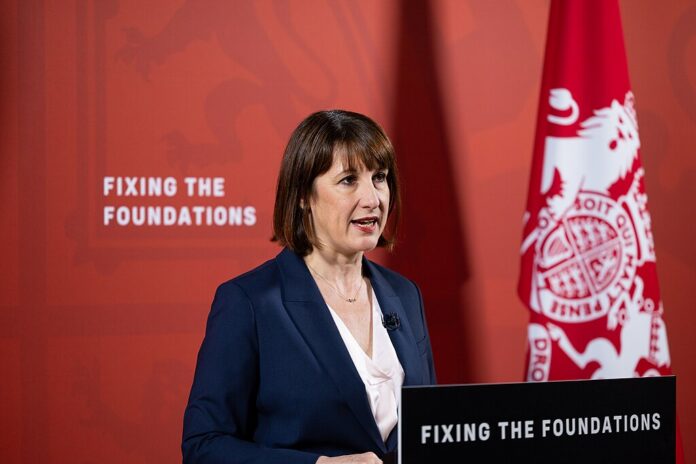International Monetary Fund calls for a balanced approach of spending cuts and tax increases to effectively reduce national debt
The International Monetary Fund (IMF) has issued a stark warning to the UK government, highlighting that Chancellor of the Exchequer Rachel Reeves must implement significant spending cuts alongside tax increases if she intends to effectively reduce the nation’s soaring debt levels. This analysis arrives amid concerns that national debt is projected to reach unprecedented heights, surpassing $100 trillion (£76 trillion) globally this year.
The IMF’s report, released on Tuesday, underscores that many advanced economies, including the UK, United States, France, and Italy, are facing rising debt trajectories well into the next decade. In Britain, national debt has already reached a staggering 100% of GDP, prompting urgent calls for action from financial institutions and economists alike.
Reeves has publicly committed to two key fiscal rules: she will only borrow to invest and aims to achieve a reduction in overall debt within the current parliamentary term. However, there is growing speculation that she may need to relax these rules to allocate more funds towards infrastructure projects, particularly in light of the IMF’s guidance.
Embed from Getty ImagesWhile the Chancellor has ruled out a return to austerity measures, her strategy appears to rely heavily on tax increases as a primary mechanism for addressing the public finances. The IMF, however, argues that an approach focused solely on taxation would be “undesirable.” Its analysis advocates for a more balanced strategy that incorporates both tax rises and necessary spending cuts to achieve sustainable debt reduction.
SKY NEWS
Chancellor of the Exchequer Rachel Reeves is aiming to resolve a significant £40 billion funding shortfall in the UK’s finances, according to sources familiar with the upcoming budget. This figure is more than double the previously estimated £22 billion deficit left by the Conservative government, which Reeves has cited as necessitating “tough decisions” like potentially cutting the winter fuel payment.
The search for additional funding has led to speculation that Labour may consider increasing National Insurance contributions for employers to bolster revenue. Such measures could impact both businesses and consumers, with leading economists warning that the mention of “difficult decisions” might dent confidence in the economy.
The £40 billion target aims to ensure that key government departments avoid real-term spending cuts while also addressing the financial fallout from the previous administration’s overspending. This budget is crucial for building a fiscal buffer for the remainder of Parliament, enabling Labour to manage its financial commitments effectively.
The Treasury has refrained from commenting on the specifics of budget discussions, leaving many details under wraps as Labour prepares for its first budget announcement.
THE GUARDIAN
spending, welfare, and tax, while underscoring the need to unlock private sector investment to stimulate economic growth. A Labour spokesperson reiterated the importance of filling the financial gap to maintain public services.
Internal Treasury calculations suggest that the current fiscal challenges encompass costs associated with public sector pay, support for Ukraine, and the asylum system. There is a concern that cabinet ministers may not fully grasp the extent of the fiscal deficit, viewing the budgetary situation primarily through their departmental lenses.
Despite the tough realities outlined by Reeves, the government is pushing ahead with plans to borrow tens of billions for infrastructure projects, adapting fiscal rules to accommodate this. The budget is set to prioritise long-term investment in areas such as rail and roads, alongside initiatives in renewable energy and public services.
Furthermore, Reeves is expected to reaffirm Labour’s commitment to a fiscal rule prohibiting borrowing for day-to-day spending, echoing former Chancellor Gordon Brown’s approach to responsible fiscal management. This strategy aims to bolster market confidence while the government seeks to lay the groundwork for sustainable economic growth.
BBC
Chancellor Rachel Reeves is preparing to implement £40 billion in tax increases and spending cuts as part of her upcoming Budget, set to be announced on 30 October. At a recent political cabinet meeting, Reeves explained that the £22 billion fiscal shortfall inherited from the previous government would only suffice to maintain current public service levels, necessitating further financial measures to prevent real-terms cuts across government departments.
Reeves warned her cabinet of the “difficult decisions” ahead regarding spending, welfare, and tax, as the government aims to avoid a return to austerity. She is establishing a new borrowing rule that mandates all day-to-day spending be funded through taxes, not borrowing, which has led to the need for both welfare savings and tax hikes.
While the Treasury has declined to comment on specific tax changes before the Budget, Prime Minister Keir Starmer did not rule out increasing National Insurance contributions for employers. Currently, employer pension contributions are exempt from the levy, but officials are exploring the possibility of subjecting them to National Insurance to bolster revenue.
The proposed tax increases have drawn criticism from business groups, who argue that such measures could hinder economic growth and negatively impact sectors like hospitality. The £40 billion figure is considerably higher than previously acknowledged, as ministers grapple with the realities of fulfilling their commitment to avoid austerity.
With two weeks to go until the Budget, the government is preparing the public for forthcoming tax rises and setting the stage for discussions on who should shoulder the financial burden.
